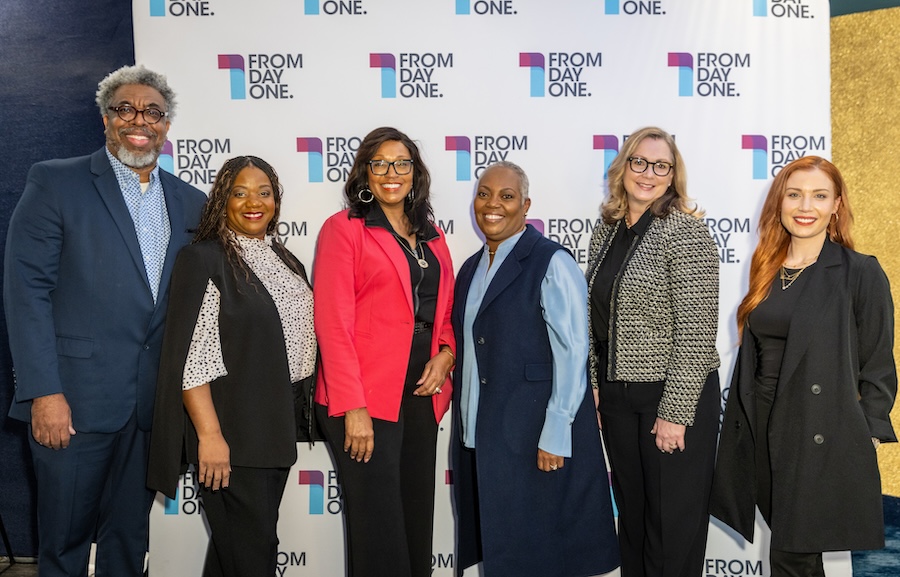Diverse Perspectives, Unified Goals: Embracing Diversity in the Workplace


Kristin Taylor, executive vice president of workforce solutions at Avenica, knows what it is like to have an identity that is often misunderstood.
During From Day One’s conference in Atlanta, Taylor shared that she is bipolar. “That does not mean that I’m unpredictable,” she told panel moderator Ernie Suggs, race and culture reporter for the Atlantic Journal-Constitution. “I just get really sad sometimes, and I struggle with things like public speaking and networking.”
At Avenica, Taylor feels supported. For example, if things are too much for her while attending a conference, she can always ask a colleague at the event to step in for a bit, she says. “How fabulous is it that we can all be our authentic selves, and really feel like we can articulate our needs and our preferences?” Taylor said. “We are really welcoming that conversation [around] diversity of thought but also diversity of preference.”
Taylor’s story illustrates why it isn’t enough for companies to simply invite people of color, women, and others who traditionally have not been part of the dominant culture to join their team.

Karlene Gordon, senior vice president and diversity and inclusion officer at Ameris Bank, said she once heard Creative Artists Agency global DEI speaker Nzinga Shaw say at a conference: “If you’re inviting people into a dirty house, they’re not going to stay.”
“If you go to someone’s house and it’s filthy, do you sit down? Do you take a glass of water from them? Or are you trying to find your exit real quick?” Gordon said.
Many people of color already have imposter syndrome, says Gordon. If the leader of the company that hires them is unaware of this common issue, “they’re not going to perform.”
Kitty Chaney-Reed, chief leadership, culture and inclusion officer at IBM said the company has eight communities for employees with various identities, including veterans and neurodivergent folks.
“It helps in terms of giving people a place to fit in,” she said. “And there’s intersectionality. People can belong to more than one community. For us, that has been a huge game changer.”
IBM also ensures that a college degree is not a necessity for entry, says Chaney-Reed. Over the past three years, only 50% of the available jobs with the company required applicants to be university graduates.
Making the Case for DEI
The highest performing organizations worldwide are those that focus on building a strong culture based on diversity, equity, and inclusion strategies, according to a recent partnered study between Fortune magazine and the Institute for Corporate Productivity.
Liz Pittinger, VP of customer success at Stork Club, a family building and reproductive health company that helps employee groups design benefit packages, says that’s something she emphasizes when working with HR leaders.
“One of the things that we do whenever we’re partnering with our customers or prospects is help arm their teams with the data points they need to go in front of the decision maker who controls the budget,” she said.
Part of Pittinger’s job is to explain why Stork Club has certain benefits, like its doula program, and how they can impact company culture. Research shows that having a doula in the room with the person who is in labor can save lives.
This is especially crucial for women of color, who have a far greater maternal mortality rate in the United States than their white peers, says Pittinger. “A wealthy, highly educated Black woman with access to great care is still three times more likely to die than a poor white woman in a rural community,” she said.
Getting to Know the Workforce
An important step toward fostering a workplace that embraces diversity of all kinds is to build relationships with the employees, says Cheryl Kern, vice president of DEIB at MillerKnoll.
“As I came into our organization three years ago, the first thing that I wanted to do was understand our people, because through understanding you truly get to know the culture and identify the areas that need to be transformed,” she said.
Another advantage of this approach is “when people see you are about them, they will care about the work you’re doing,” Kern said.
Now that DEI efforts nationwide are experiencing pushback, Kern’s relationship-building efforts are paying off. “While the external waters are really choppy, we have brought along advocates and allies that have said, ‘I’m on this journey with you,’” she said.
Mary Pieper is a freelancer reporter based in Mason City, Iowa.
The From Day One Newsletter is a monthly roundup of articles, features, and editorials on innovative ways for companies to forge stronger relationships with their employees, customers, and communities.